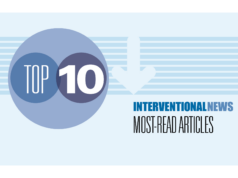 The March top 10 features news that the US trial of the LimFlow system designed to prevent amputations has completed enrolment. Other highlights include two video interviews addressing the treatment of the superficial femoral artery (SFA), as well as a report of an ECR 2022 session, in which Thomas Helmberger called for a “shift [in] treatment focus from volume to value”.
The March top 10 features news that the US trial of the LimFlow system designed to prevent amputations has completed enrolment. Other highlights include two video interviews addressing the treatment of the superficial femoral artery (SFA), as well as a report of an ECR 2022 session, in which Thomas Helmberger called for a “shift [in] treatment focus from volume to value”.
Enrolment has been completed in the PROMISE II pivotal trial of the LimFlow deep vein arterialisation system designed to prevent amputations in so-called “no-option” chronic limb-threatening ischaemia (CLTI) patients, the eponymous device maker announced today.
2) Evidence in the SFA: What kind of stent should we use?
Antonio Micari (interventional cardiologist, Italy) gives his thoughts on the EMINENT RCT and whether it may have influenced his decision to use drug-eluting stents and drug coated balloons after a percutaneous transluminal angioplasty.
3) ECR 2022: Interventional oncology is the fourth pillar of oncology—a shift is needed
With cancer cases growing worldwide and an increased number of late-stage diseases in elderly patients, there is an increasing need for an integrated approach. “Through evidence, cost, and acceptance of interventional oncology (IO), we can create value-based care and shift the treatment focus from volume to value”.
4) Merit Medical wins FDA breakthrough nod for microspheres for treating knee osteoarthritis
Merit Medical announced that it has received US Food and Drug Administration (FDA) breakthrough device designation for its Embosphere microspheres.
Johns Hopkins Medicine researchers have developed and tested a new imaging approach they say will accelerate imaging-based research in the lab by allowing investigators to capture images of blood vessels at different spatial scales.
6) Evidence in the SFA: Considering the data when making decisions for patients
Koen Deloose (vascular surgeon, Belgium) looks at the evidence needed in order to make the best decisions for his patients when treating the superficial femoral artery (SFA). Deloose dives into the implications on daily practice of the EMINENT RCT results, as well as stenting strategy and the use of paclitaxel in the future.
The VasQ external support device (Laminate Medical) has demonstrated long-term benefits for radiocephalic (forearm) arteriovenous fistula (AVF) creation in a retrospective analysis of 150 consecutive procedures. Robert Shahverdyan (Asklepios Klinik Barmbek, Hamburg, Germany) and Dirk Hentschel (Brigham and Women’s Hospital, Boston, USA) have published these data in Seminars in Dialysis.
Six-month outcomes from the ongoing CLOUT registry demonstrate the “safety and efficacy” of the ClotTriever thrombectomy system (Inari Medical) in a real-world deep vein thrombosis (DVT) population regardless of clot chronicity level, the 2022 annual meeting of the American Venous Forum (AVF; 23–26, Orlando, USA) heard.
9) Instylla first-in-human clinical trial published results demonstrate success
A prospective multicentre study has evaluated the safety and efficacy of a polyethylene glycol (PEG)-based liquid embolic in treating hypervascular tumours, according to an Instylla press release.
10) S.M.A.R.T. Radianz vascular stent system approved for transradial use in the USA
Cordis recently announced that the US Food and Drug Administration (FDA) has approved the S.M.A.R.T. Radianz vascular stent system, a self-expanding stent purposefully engineered for radial peripheral procedures.









